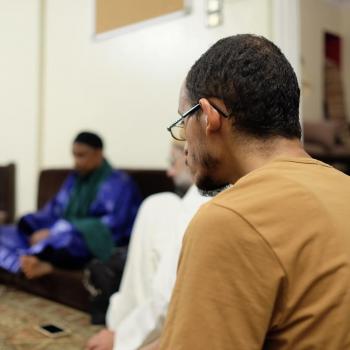I’m all for uplifting messages that inspire us to put forth our best effort in worshiping Allāh  during Ramadan. However, in lands where people do not have the luxury of time and sleep post-suhoor, getting maximum benefit out of Ramadan requires a bit of doing before entering into the month full force. With this in mind, the following is a series of posts covering:
during Ramadan. However, in lands where people do not have the luxury of time and sleep post-suhoor, getting maximum benefit out of Ramadan requires a bit of doing before entering into the month full force. With this in mind, the following is a series of posts covering:
Part 1 – Training Season: The month of Ramadan can be as physical as it is spiritual, and the body needs time to adjust. How can we “train” ourselves for the physicality of it beforehand? What practices can we take from the Sunnah of the Prophet  to help us?
to help us?
Part 2 – Goal Setting: While we certainly want to push ourselves above and beyond our normal spiritual limits, we also want to be careful of making unrealistic goals, as this can set up unrealistic expectations for what will get done and can cause a rapid loss of momentum, resulting in functioning on a “bare minimum” mindset. How can we set realistic goals that make sense not only for ourselves personally, but as well in the context of the needs of others around us.
Part 3 – Calendaring: This goes hand-in-hand with Goal Setting – how will you schedule your week, given your Ramadan goals and still-running commitments? This article will show you an easy way to do that, and why it’s important to do so.
Part 4 – Miscellaneous Stuff: We’ll cover clearing your schedule, working out, and other items of concern to keep in mind during this month.
Personal and time management articles have a tendency towards coma-inducing detail. I will make every attempt to keep these brief and prescriptive, but beware of conflating simplicity with ease 😉 Parts 1 and 2 are covered here.
Part One: Training for the Ultimate Spiritual Triathlon
An Ironman Triathlon involves 2.4 miles of swimming, followed immediately by 112 miles of biking, and again followed immediately by 26.2 miles of running. Can you imagine showing up to compete with no preparation, no training, and not even so much as a warm-up before starting? Can you imagine thinking, “I’ll do this event to kickstart swimming, biking, and running more regularly”?
You’d never do something like that. If you wanted to compete, you’d train ahead of time, build up your strength and endurance, and then push yourself to the extreme during the event. Once the event is done, you’d return back to maintenance and training.
Ramadan is the ultimate spiritual triathlon of siyaam (fasting), ṣalāh (prayer), and Qur’an. We fast all day, pray throughout the day, attempt to complete the Qur’an during the month, and pray late evening / pre-fajr early morning prayers. To truly take this month on and reap its full benefits, we have to contend with the sheer physicality of it if we’re to maintain the consistency required to reap the full reward that awaits us.
Ramadan is when you show up with your game face on. Let’s start training for it now.
Fasting
The Prophet  was known for fasting Mondays and Thursdays[1], recommending fasting the 13th, 14th, and 15th of the month[2], and increasing his fasting during the month of Sha’baan more so than any other month apart from Ramadan[3]. With this level of consistency, it’s a safe bet he didn’t have the caffeine and fasting detoxification withdrawals that occur with many of us when we return to Ramadan. With this in mind, let’s consider how we can ramp up our fasting this month. Click here to learn more about how to build up your fasting before Ramadan (since we are already nearly upon the start of the month, this may help you next year):
was known for fasting Mondays and Thursdays[1], recommending fasting the 13th, 14th, and 15th of the month[2], and increasing his fasting during the month of Sha’baan more so than any other month apart from Ramadan[3]. With this level of consistency, it’s a safe bet he didn’t have the caffeine and fasting detoxification withdrawals that occur with many of us when we return to Ramadan. With this in mind, let’s consider how we can ramp up our fasting this month. Click here to learn more about how to build up your fasting before Ramadan (since we are already nearly upon the start of the month, this may help you next year):
The Five Daily Prayers
The five daily prayers are the second pillar of Islam and required. Most people are not lazy in and of themselves, they just don’t see the importance and priority of this habit[6]. If you’re one of those who skips the five daily prayers but goes crazy to get to taraweeh, realize that the amount of religious zeal you have towards Ramadan taraweeh vs the five daily should be switched around. If you skipped all of taraweeh forever and just did the bare minimum five daily prayers for the rest of your life, that would be better for you, if you had to choose, as nothing brings you closer to Allāh  than obeying Him in the duties He’s required upon us. If you don’t have the five daily prayers down, this is where you start, nowhere else.
than obeying Him in the duties He’s required upon us. If you don’t have the five daily prayers down, this is where you start, nowhere else.
Next year before Ramadan starts, you can begin with the easiest prayer for you to fulfill in its proper stated time in the first week. From there, start doing two prayers daily in week 2, then three in week 3, and finally four in week 4. By the time Ramadan starts, you should be hitting all 5 every single day, and this will likely be the most singular important habit in your life that you must maintain post-Ramadan, no matter what.
12 Daily Sunan
There are more than 12 Sunan prayers one could complete in a day, but a good starting point is to get 12 sunan prayers in daily with consistency, and these are:
- 2 rakat before Fajr
- 2 or 4 rakat before Dhuhr, and 2 rakat after
- 4 rakat before ‘‘aṣr
- 2 rakat after Maghrib
- 2 rakat after ‘Ishaa
Tahajjud / Qiyam ul-Layl
Since there are likely few masjids performing any type of qiyaam style prayers at night, it’s up to you get started on this. It’s a great time to gather your family, if you live with them, and pray together. I would recommend attempting to complete 1/4th to 1/2 a juz (5 – 10 pages, respectively) within 8 or 20 rakaat (your choice).
If your level of memorization is less than a half juz, don’t sweat it, just recite the same surahs multiple times in each prayer, and recite them in multiple prayers. The point is to stand and pray to Allāh  with whatever you have, and inshā’Allāhit will be accepted and rewarded.
with whatever you have, and inshā’Allāhit will be accepted and rewarded.
Finally, you can do it on evenings of the nights you fasted if you’re already in spiritual beast mode from fasting, or you can do it on non-fasting days to because you’d like to relax on days you fasted – it’s your call to make.
Quran Recitation
The Prophet  would revise the Quran every Ramadan, so all of us should have a goal of completing the Quran as many times as possible. While it is normally recommended to read with understanding, during Ramadan some scholars recommend focusing on attaining the reward for reciting alone. Minimally, that would entail reading 20 pages / day on average to complete the Quran. In order to shake off the cobwebs if you’re out of practice, start with the lower number and ramp to the higher number by the end of the week. So if the recommendation is 2 – 4 pages for that week, start with 2 pages a day, then go to three, and end the week with 4 pages a days:
would revise the Quran every Ramadan, so all of us should have a goal of completing the Quran as many times as possible. While it is normally recommended to read with understanding, during Ramadan some scholars recommend focusing on attaining the reward for reciting alone. Minimally, that would entail reading 20 pages / day on average to complete the Quran. In order to shake off the cobwebs if you’re out of practice, start with the lower number and ramp to the higher number by the end of the week. So if the recommendation is 2 – 4 pages for that week, start with 2 pages a day, then go to three, and end the week with 4 pages a days:
When Ramadan itself starts, there are many different ways to go about completing the Quran, depending upon your time constraints, and in part 2 we’ll review some techniques that can be used to make completing the Quran easier in Ramadan,inshā’Allāh.
Make a Calendar
I consider prayer and Quran important, so they are given their own appointment time and schedule. Prayers are given a full half hour for wuḍūʼ’, the fardh, and the sunan prayers. I place Quran reading after Fajr because it’s generally a good habit to get the most important matters done first. And, while reading the Qur’an is spiritually uplifting, knowing there’s one less item to complete is less worry in your mind. Besides, it’s a great way to start the day 😉 But if post-Fajr is too much for you, make sure you choose a time when you’ll have mental energy to put in the effort to read.
Another reason to put it in your calendar is because you can set up alerts that sync with your smartphone (if you have one) and can track your day and religious habits right from there, inshā’Allāh.
Part Two – Planning and Hitting Ambitious Goals Easily
It’s great to have ambitious goals for Ramadan, but in order to achieve those goals, one must be able to deal with the challenges of Ramadan which include decreasing energy levels (from a combination of lack of food and sleep), decreasing enthusiasm in the middle of the month, and maintaining the rest of your commitments (work, school, kids, etc) while increasing the time commitment of your worship; and since you don’t live in a vacuum, you have to reconcile your schedule with others who may depend on you for supporting them in their goals and vice versa.
In Part Two, I will cover some common goals. What is important is that you have a means by which you can determine which goals are sensible for your situation and how to make them happen.
For goals that take time and occur daily, the methodology is as follows:
- Time Commitment
- Technique to complete
- The Bare Minimum
For goals that do not require time, or they require one-time efforts that take time, I will highlight some strategies to consider.
Five Daily Prayers with Sunan
1. Time Commitment
While the five daily prayers are often said to consume at most 5 minutes per prayer, averaging 30 minutes a day, this is a poor way to get even people who don’t pray thinking about it. In reality, praying often entails making wuḍūʼ’, drying off, praying the fardh and the sunnah prayers, and possibly du‘ā’. Additionally, by setting the bar low on time, we effectively make the ṣalāh a timed dash + aerobic workout, which complete defeats the idea of having khushoo’.
2. Technique to Complete
Since we’re in summer, we have at best two prayers to complete while working (if we’re not telecommuting), and the other three at home or in the masjid. That said, we should put aside 15 – 20 minutes at work for the complete act, and 30 minutes outside of work. If you have the luxury of time on your job, you can complete the sunan prayers as well over here, otherwise you can make them up at home or in the masjid.
On the job, block out the time in your Outlook calendar, get a conference room if you can, and get praying. If you’re under tight time constraints, such as in a factory, then make your manager aware of your situation and let them know you’ll take a short amount of time. In this type of an instance, a mad dash to completion might be necessary.
3. The Bare Minimum
If on a particular day you’re crunched for time, the bare minimum is always to complete the five daily prayers. Make sure it’s always taken care of. If you’re someone who has not previously prayed the five daily prayers consistently (or at all), this is your #1 habit to develop and keep. Maintain it and never let it go thereafter.
Completing the Quran
1. Time Commitment
Depending on how quickly you complete reading 1 juz (20 pages), your time commitment might be anywhere from 10 minutes to 2 hours.
2. Technique to Complete
A number of good methods exist to complete the Quran:
- One Juz Daily Method: Read 20 pages per day, starting with the first night of Ramadan.
– Method 1: Pick a time block during which you’ll read all 20 pages (e.g. after fajr, during lunch break, commuting home from train, etc)
– Method 2: Break up the daily reading into smaller chunks throughout the day (e.g. read 4 pages after each prayer). - I’tikaf Method: If you plan on staying in the masjid for I’tikaf, you can set a daily amount to read that is substantive but achievable (e.g. 5 – 10 pages, can vary each day) and then spend I’tikaf completing the Quran.
- Energy Level Method: Read more Quran in the first night (e.g. 2 – 5 juz) and then average out the daily amount to read that remains for the following 29 days.
3. The Bare Minimum
If for some reason you find that completing the Quran is out of your reach, that’s ok. Set an easily achievable daily amount (e.g. 3 pages) and if you feel like you have more energy on some days, read more, and if you’re out of sorts on other days, stick to your daily minimum.
Nightly Tarawih
1. Time Commitment
Tarawih can be anywhere from 1 – 2 hours after ‘Isha prayers.
2. Technique to Complete
You may be tired from all that’s gone on the previous day before getting to this point. Standing for 8 – 20 rakat of 20 pages of Quran recitation is unbelievably physically taxing, you may experience a post-iftar food coma, and your mind might be wandering hither and dither. If that’s the case, treat yourself to a cup of chai or a strong brew of coffee.
3. The Bare Minimum
More important than tarawih prayer in the masjid is ‘Ishaa at the masjid. If you must get one prayer at the masjid at night, make sure you get ‘Ishaa, don’t time things so you show late for tarawih and miss ‘Ishaa as that was the most important prayer of the night to get in congregation.
Beyond this, try to get at least four rakaat in tarawih. If it becomes too physically taxing, sit down for part of one raka’ah and then get back into it – do this only as needed to deal with exhaustion, not as a habit for each and every two rakaat.
Family Time
When I say family time, I mean time you spend with your family (kids, spouse, parent) hanging out, doing stuff together – playing games, reviewing Quran stories, relaxing and talking about the day, whatever brings you together. This time is crucial and for those who are so ‘ibadah-focused, consider this your daily dose of daw’ah for your family.
1. Time Commitment
Depending on your circumstances, can be anywhere from 30 minutes to 3 hours (or more).
2. Technique to Complete
Spending time with family may be the last thing you want to do after a long day of fasting, but remember that some of the best memories, positive associations with faith, and more good are during those times when the whole Muslim community is engaged in extra worship and good will towards one another.
- Look into your schedule and set aside time to spend with family.
- Ask them what they want to do with you, and try to accommodate it.
- Don’t gorge during iftar, or you’ll find yourself drifting into a food coma.
- Try to come up with an activity everyone will like. Don’t force kids into boring lectures with your favorite teacher that only you like – let them choose.
- Make sure to have fun!
3. The Bare Minimum
Try to get at least 30 minutes each day with your family, where they have access to you and can spend time with you during this month.
I’tikaf – Seclusion in masjid for Worship
1. Time Commitment
Given the modern work day, many will not be able to do the full ten days without taking paid time off on the weekdays.
2. Technique to Complete
- If you’re the type of person who gets motivation by being in a masjid where there are lots of people worshipping and people you know, then that’s where you go.
- If you’re the type of person who wants to be left alone and undisturbed, a smallermasjid with less traffic may be better for you.
- Besides the food, clothing, hygiene, and camping gear, be sure to bring a Qur’an mushaf that isn’t electronic (keep off your phone or tablet), a book of du’aas, a good translation of the Qur’an, and audio of your favorite reciter to listen and then recite while reading.
- If you’re obsessive-compulsive about fitness like I am, you can also download the “You Are Your Own Gym” app and, after breaking your fast, do 4-minute Tabata intervals with your own bodyweight (no equipment needed).
3. The Bare Minimum
Try to at least come in Friday evenings to your masjid of choice and leave Sunday evening.
Other Goals
1. Du‘ā’ List
Before Ramadan begins, record a du‘ā’ list (in a note taking application like Google Keep, which syncs with smartphone and desktop web app). You may have some Prophetic du’aas that you’ve memorized in Arabic, so remember to say those often, but also remember du’aas related to:
- Your Afterlife: The grave, the Day of Judgment, and your final home
- Bettering Yourself: Your Islamic practice, manners, and habits, your personal, fitness, financial, and professional development.
- Your Family
- The Community
- Those Suffering
- Remember to ask to be forgiven and to have your Ramadan ‘ibadah accepted.
- Remember to thank Allāh for all that He’s given you, both the mundane and the monumental.
2. Charity
Besides Zakat al-Fitr, there are many opportunities to donate and it can seem confounding deciding where to send money. I would recommend the following:
- Automate monthly sponsoring of orphans via Islamic Relief USA or some other organization. If you already do this, add another orphan.
- Automate monthly support of your local masjid. If you already support them, add more to the amount you support, or support another local masjid that needs income.
- Encourage close friends and family to do likewise #1 and #2.
- Find a worthy cause that needs a good lump sum amount of money. Decide how much you plan to donate, multiply that by 3, and then donate that amount to that org in the last 10 nights.
3. Help Others Achieve Their Ramadan Aspirations
While you should be busy with your Ramadan worship, you should also keep in mind others in your home may be making life easier for you by taking care of certain shared responsibilities. You should likewise proactively approach a parent, spouse, sibling, or child and see what their Ramadan goals are and how you can help them achieve them.
For example, if your wife wants to attend tarawih, but the masjid doesn’t allow kids in the women’s area, it’s not practical for both of you to attend tarawih, but is it possible for the husband to attend the fardh and then take the kids after to allow the wife to pray? Can you work out a schedule alternating days, or maybe weekdays vs weekends? Neither one of you will get to pray all 29 or 30 days in tarawih in this set up, but you’ll both get good quality ‘ibadah from worship, and time with the kids otherwise, which shouldn’t be underestimated.
4. No Arguing
Every single year, arguments about the start and end of Ramadan reach a fever pitch as to which opinion is correct, what methodology some group is following this year as opposed to last year and the politics underlying why all those decisions were made, and then some.
It’s almost like before the shayateen are chained up, they leave with one last parting shot to get everyone angry and disunited. What follows is the calm frenzy of intense worship, which ends with ‘Īd moonfighting.
Remember two pieces of advice from the Prophet  about argumentation:
about argumentation:
- The one who gives up an argument, even when he is right, has a palace in Paradise built for him or him.
- If someone argues with you while you’re fasting, you’re instructed to tell them you’re fasting.
That’s it. Don’t argue about anything. If someone starts asking your opinion, tell them you’d rather not talk about it. If they insist you talk about it, you insist you’re not talking about it. If they start telling you about others and their wrong opinions, smile (because it’s sunnah), and politely walk away.
The original and expanded version of this Part One post appeared in Muslim Matters. The original version of the Part Two post also appeared in Muslim Matters.
References
- It was narrated that ‘Aa’ishah (may Allāh be pleased with her) said: The Prophet (peace and blessings of Allāh be upon him) was keen to fast on Mondays and Thursdays. Narrated by al-Tirmidhi, 745; al-Nasaa’i, 2361; Ibn Maajah, 1739; classed as saheeh by al-Albaani in Saheeh al-Targheeb, 1044.
- It was narrated from Jareer ibn ‘Abd-Allāh (may Allāh be pleased with him) that the Prophet (peace and blessings of Allāh be upon him) said: “Fasting three days of each month is fasting for a lifetime, and ayaam al-beed are the thirteenth, fourteenth and fifteenth.” Narrated by al-Nasaa’i, 2420; classed as saheeh by al-Albaani in Saheeh al-Targheeb, 1040.
- Muslim (1156) narrated that Abu Salamah said: “I asked ‘Aa’ishah (may Allāh be pleased with her) about the fasting of the Messenger of Allāh (peace and blessings of Allāh be upon him), and she said: ‘He used to fast until we thought that he would always fast, then he would not fast until we thought that he would always not fast, but I never saw him fast in any month more than he fasted in Sha’baan. He used to fast all of Sha’baan, and he used to fast all of Sha’baan apart from a few days.’”
- http://islamqa.info/en/81621
- http://islamqa.info/en/13726
- “The first matter that the slave will be brought to account for on the Day of Judgment is the prayer. If it is sound, then the rest of his deeds will be sound. And if it is bad, then the rest of his deeds will be bad.” [Recorded by al-Tabarani. According to al-Albani, it is sahih. Al-Albani, Sahih al-Jami, vol.1, p. 503.













